Mobile App Development for Remote Counseling: Innovations Redefining Mental Healthcare
The Rise of Remote Counseling
In recent years, remote counseling has emerged as a transformative solution for individuals seeking mental health support. The convenience, accessibility, and flexibility it offers have made it an increasingly popular option, particularly in light of the COVID-19 pandemic and its impact on traditional in-person counseling services.
Benefits of Mobile Counseling Apps
Mobile counseling apps have further amplified the benefits of remote counseling. They provide a secure and portable platform for individuals to connect with licensed therapists from anywhere, at any time. These apps offer a range of features tailored to enhance the counseling experience, including:
Convenience: Apps eliminate the need for travel, allowing users to attend counseling sessions from the comfort of their own homes or on the go.
Accessibility: Apps make counseling services available to individuals in remote areas or with limited mobility. They also reduce the stigma associated with seeking mental health support.
Affordability: Compared to traditional in-person counseling, mobile apps often offer more affordable options, making mental healthcare more accessible to a wider population.
Key Considerations for App Development
When developing mobile counseling apps, it is essential to prioritize user privacy, data security, and the overall user experience. Developers must ensure compliance with relevant regulations and industry standards to protect user information and maintain trust. Additionally, apps should be intuitive and user-friendly, with a focus on accessibility and inclusivity.
Innovative Features for Remote Counseling Apps
Beyond basic functionality, mobile counseling apps are incorporating innovative features to enhance the user experience and improve therapeutic outcomes. These features include:
AI-Powered Chatbots: Chatbots provide immediate support and triage, connecting users with appropriate resources and therapists. They can also assist with scheduling appointments and reminders.
Virtual Assistants: Virtual assistants offer personalized guidance and support throughout the counseling journey, providing tailored insights and resources. They can also facilitate communication between users and therapists.
Integration with Mental Health Platforms
Mobile counseling apps are increasingly integrating with mental health platforms and other healthcare services. This integration allows for seamless sharing of patient information, coordinated care, and improved outcomes. By connecting with platforms that offer a range of services, such as medication management, support groups, and crisis support, mobile apps provide a comprehensive and holistic approach to mental healthcare.
Data Security and Privacy in Mobile Apps
Protecting user data and privacy is paramount in mobile counseling app development. Developers must implement robust security measures to safeguard sensitive information, such as user demographics, session notes, and communication between therapists and clients. Adherence to industry-recognized security standards, such as HIPAA and GDPR, ensures that data is handled responsibly and securely.
AI-Powered Chatbots and Virtual Assistants
AI-powered chatbots and virtual assistants are transforming the remote counseling experience by providing immediate and personalized support. Chatbots can triage users, offering self-help resources, scheduling appointments, and connecting them with appropriate therapists. Virtual assistants provide ongoing guidance, reminders, and personalized insights throughout the counseling journey. By leveraging AI, mobile apps can enhance accessibility, reduce wait times, and improve overall engagement.
Augmented and Virtual Reality Applications
Augmented and virtual reality (AR/VR) are emerging technologies that are being explored for use in remote counseling. AR overlays digital information onto the real world, while VR creates immersive virtual environments. These technologies can enhance therapeutic interventions by enabling users to interact with virtual simulations, practice coping mechanisms, and engage in mindfulness exercises.
User Interface and Experience Optimization
The user interface (UI) and user experience (UX) of mobile counseling apps play a crucial role in determining user satisfaction and engagement. A well-designed app with an intuitive interface makes it easy for users to navigate, access features, and communicate with therapists. By prioritizing usability, simplicity, and accessibility, developers can create apps that foster a positive and supportive environment for mental health management.
Emerging Trends and Future Prospects
The future of mobile counseling app development holds exciting prospects. Emerging trends include the use of machine learning for personalized treatment recommendations, predictive analytics for early intervention, and remote monitoring capabilities. Continuous advancements in technology will further enhance the integration of mobile apps into comprehensive mental health ecosystems, offering users a wide range of innovative and effective support tools.
FAQ:
How effective is remote counseling through mobile apps?
Mobile counseling apps can be just as effective as in-person counseling, offering a convenient and accessible alternative to traditional therapy.Are mobile counseling apps secure and private?
Reputable mobile counseling apps prioritize data security and privacy by adhering to industry-recognized standards and implementing robust encryption measures.How do I choose a reliable mobile counseling app?
Look for apps developed by licensed mental health professionals, with a proven track record of positive user feedback and compliance with data protection regulations.


